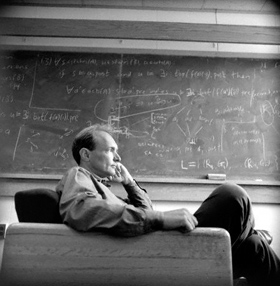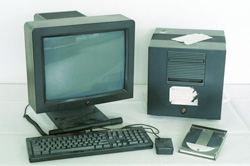Difference between revisions of "Tim Berners-Lee"
m |
|||
| Line 11: | Line 11: | ||
===Berners-Lee, W3c and Information Ethics=== | ===Berners-Lee, W3c and Information Ethics=== | ||
---- | ---- | ||
| + | Berners-Lee is the founder and Director of the World Wide Web Consortium(W3C), which is a web standards organization founded in 1994 which develops interoperable technologies to lead the Web to its full potential. <ref>Tim, Berners-Lee. "Tim Berners-Lee." W3.org. 01 Sep 2011. Web. 5 Oct 2011. <http://www.w3.org/People/Berners-Lee/>. </ref> The W3C supports the decentralization of information and promotes the use of the WWW as public resource tool. The W3C was partially created for the purpose of deflating any private business whose main objective was to set barriers of entry to the web by charging upfront costs to using their browsers (See Netscape vs. Microsoft 1995). | ||
=== Acheivements and Awards === | === Acheivements and Awards === | ||
| Line 26: | Line 27: | ||
---- | ---- | ||
<references> </references> | <references> </references> | ||
| − | + | ||
1-[http://www.w3.org] | 1-[http://www.w3.org] | ||
[[File:Berners-Lee_WWW_Computer.jpg]] | [[File:Berners-Lee_WWW_Computer.jpg]] | ||
Revision as of 21:47, 5 October 2011
Contents
Tim Berners-Lee's Contributions to Ethics and Information Technology
Tim Berners-Lee, a computer scientist and physicist known for inventing the World Wide Web, has also had one of the most successful individual impacts on the standards and ethics that govern the way the World Wide Web from its creation up until today. Even though there were numerous opportunities for him to become rich from his own creation, Berners-Lee has consistently supported making the World Wide Web (WWW) accessible to everyone, with no single ownership or user fees for its use. Berners-Lee is the founder of the World Wide Web Consortium (W3C) whose mission statement is "To lead the World Wide Web to its full potential by developing protocols and guidelines that ensure long-term growth for the Web."[1]
Berners-Lee and a Brief History of the World Wide Web
In 1991, a few computer scientists released the World Wide Web (WWW) in a lab at CERN. Tim Berners-Lee co-created the World Wild Web (WWW) on a server-based computer by using the Internet (a medium for sending and receiving files, pictues, text, etc.). He joined multiple webpage together by using the first ever hypertext link. This made possible a “web” of created documents (made by using computer code, specifically HTML) to be edited and connected on a Internet Browser called MOSAIC. Once other computer scientists found out about Berners-Lee’s new invention, they started creating webpages on their own browser. (minnessota-ended up being software used at microsoft/netscape ) At first, the problem was that these browsers were not compatable.
Berners-Lee, W3c and Information Ethics
Berners-Lee is the founder and Director of the World Wide Web Consortium(W3C), which is a web standards organization founded in 1994 which develops interoperable technologies to lead the Web to its full potential. [3] The W3C supports the decentralization of information and promotes the use of the WWW as public resource tool. The W3C was partially created for the purpose of deflating any private business whose main objective was to set barriers of entry to the web by charging upfront costs to using their browsers (See Netscape vs. Microsoft 1995).
Acheivements and Awards
Berners-Lee Publications
Notes
{{{{{1}}}{{{2}}}|Pdf|Doc}}
References
- ↑ <http://www.w3.org/Consortium/mission.html>
- ↑ "First World Wide Web (www) server." Science Photo Library. N.p., March 30, 2011. Web. 5 Oct 2011. <http://www.sciencephoto.com/media/349909/enlarge>.
- ↑ Tim, Berners-Lee. "Tim Berners-Lee." W3.org. 01 Sep 2011. Web. 5 Oct 2011. <http://www.w3.org/People/Berners-Lee/>.

